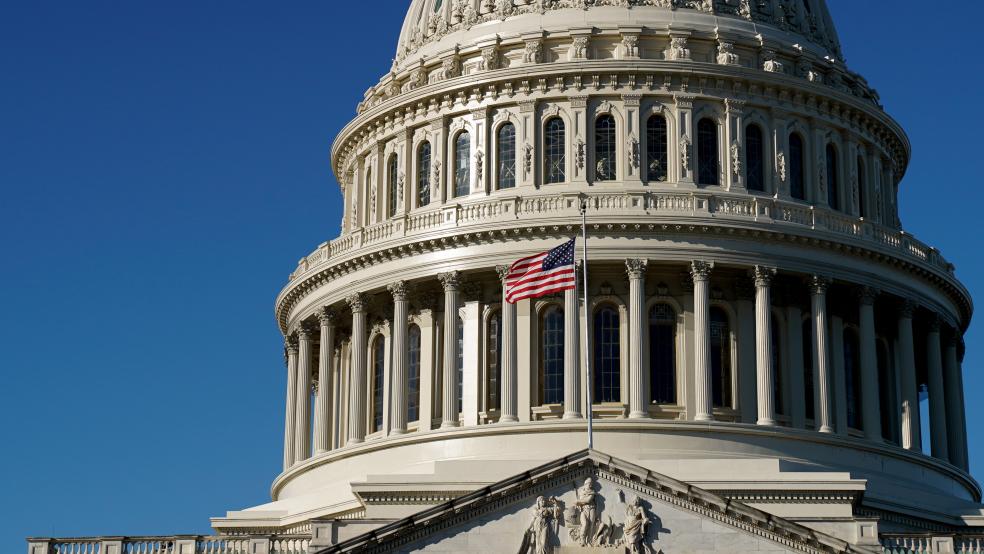The Biden administration is turning to its next major initiative, a long-term economic program that will involve both substantial new spending and significant increases in taxes for the first time in a generation, Bloomberg’s Nancy Cook and Laura Davison reported Monday.
“Unlike the $1.9 trillion Covid-19 stimulus act, the next initiative, which is expected to be even bigger, won’t rely just on government debt as a funding source,” Cook and Davison wrote. “While it’s been increasingly clear that tax hikes will be a component ... key advisers are now making preparations for a package of measures that could include an increase in both the corporate tax rate and the individual rate for high earners.”
The proposal will reportedly include public investments infrastructure, green energy and education, as well as efforts to strengthen the social safety net. At the same time, the Biden administration will seek to reform the tax system to address long-term challenges including declining federal revenues relative to the size of the economy and growing inequality.
Biden’s proposed plan is expected to include:
- Repealing some parts of the 2017 Tax Cuts and Jobs Act;
- Raising the corporate tax rate to 28%, up from its current 21%;
- Increasing the personal income tax rate for those earning more than $400,000 per year;
- Increasing the capital gains tax for high-income investors;
- Expanding the estate tax.
White House economic adviser Heather Boushey said Monday that Biden doesn’t intend to raise taxes on those earning less than $400,000, a pledge that Biden himself made during that 2020 campaign. For those making more than that amount, many of whom have done well during the Covid crisis, “there’s a lot of room there to think about what kinds of revenue we can raise,” she told Bloomberg TV.
Covering some costs, but not all: Estimates for the cost of Biden’s still-developing spending bill start at $2 trillion and move up quickly, with some analysts saying $4 trillion seems like a likely final number. The tax increases, however, aren’t expected to be as large. An analysis by the Tax Policy Center of Biden’s proposed tax increases from his campaign platform said they could raise a bit more than $2 trillion, but one former Biden adviser told Bloomberg that Democratic lawmakers might settle on about $500 billion in tax hikes.
The Biden team is expected to argue that some types of spending must be paid for but others do not, especially in an era of persistently low interest rates. Changes to the safety net, such as a permanent increase in the child tax credit, may be attached to specific revenue increases, while investments that offer returns over a long time horizon, such as infrastructure and energy projects, may be financed by deficit spending.
Yellen wants deficit reduction, but not quite yet: Treasury Secretary Janet Yellen said this weekend that whatever form revenue increases may take, she wants to reduce the federal budget deficit, though the timeframe is a little hazy. “Over time, I expect that we will be putting forth proposals to get deficits under control,” she said on ABC’s “This Week with George Stephanopoulos.” Yellen added that the administration hasn’t decided whether to push for a wealth tax, such as the one proposed by Sen. Elizabeth Warren (D-MA).
Yellen said that she isn’t overly concerned with the cost of running large deficits right now. “When I think about the burden of debt, I think about it mainly in terms of the interest payments that the government needs to pay,” she said. “And in spite of the fact that the debt has increased substantially, interest payments relative to the size of the economy have remained quite low. No higher than they were back in 2007.”
As part of the effort to raise revenues to help pay for at least part of Biden’s agenda, Yellen is working with other countries to establish a global minimum tax on multinational corporations, The Washington Post’s Jeff Stein reported Monday. The pursuit of a minimum tax is driven in part by concerns that companies will shift profits away from the U.S. if corporate tax rates are increased. But there will no doubt be powerful resistance to the effort, which is being managed through the Organization for Economic Cooperation and Development, and business interests including the U.S. Chamber of Commerce are already lobbying against it.
A bipartisan effort? Biden and some Democratic lawmakers want to make the next major economic package a bipartisan project, but Republicans aren’t showing much interest in more spending or tax hikes. Rep. Kevin Brady of California, the top Republican on the House Ways & Means Committee, said that any effort to “to tax investment of capital gains at marginal income rates” would be a “terrible economic mistake.” Senate Minority Leader Mitch McConnell (R-KY) said that following a “robust discussion about the appropriateness of a big tax increase,” he expects Democrats to use reconciliation to pass the next big bill, eliminating the need to gain any GOP support.
Chris Krueger of Cowen Research said in a note Monday that he expects the next big spending bill to play out much like that last one: “Fiscal policy shifting into a new gear with the $1.9T relief bill now in the rearview mirror BUT we suspect a very similar road, ie we will have 3-4 weeks of bipartisan optics and then Democrats will likely drop the reconciliation hammer once Republicans object to tax increases or policies too ‘green’ on the infrastructure side. Basically the sequel to the relief process.”




